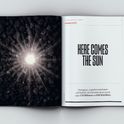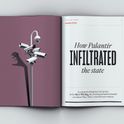Landing zone
Ukraine has witnessed horrendous Russian aggression in the weeks since Peter Ricketts wrote for you. Western policymakers are focused on how far to bolster Ukraine’s military capability; how to deter the Russians from employing chemical or nuclear weapons in battle; and, if they do, how to respond. At the same time, as the Russian campaign falters and the situation on the ground moves to siege warfare or stalemate, flickers of a reduction in Moscow’s ambitions appear—perhaps a pledge of Ukrainian neutrality and a transfer of territory to form a Russian “landbridge” to Crimea will do?
Even if Moscow plays for time, the allies, with Ukraine, should think now about postwar policy. Three components will be crucial: the territorial and security settlement; the rebuilding of Ukraine, including politically; and policy towards Russia.
There is no appetite for rewarding Russia for invasion, and Ukraine will rightly resist losing territory. But the outlines are visible of an agreement comprising armed neutrality underpinned by credible external guarantees, and a status for Luhansk and Donetsk that is better for Kyiv than that in the 2014 Minsk formula. Crimea will be hard to solve. Allies and western financial institutions should prioritise helping Ukrainians to rebuild their devastated country. The EU should commit to Ukrainian membership, accompanied by the political reform that Kyiv still needs. And Russia? It depends how long the barbarism lasts and what happens inside the Kremlin. Even if Putin is deposed, finding credible interlocutors free from complicity in war crimes will not be easy. There will be no return to cordial relations. Trust, goodwill and too many links, political and economic, have been broken. Equally, indefinite Cold War-style containment, continental division and the implicit punishment of all Russians, with the risk of forcing together a broken Russia and a dominant China, would not be wise either.
A conditional resumption of a much less integrated relationship seems on the cards. The outcome will test western unity.
Pauline Neville-Jones, former chair, Joint Intelligence Committee
Ricketts provides a perceptive account of the rise and fall of western-Russian relations since the end of the Cold War. His account, though, is limited to the relations between the governments of western countries and that of Russia. The more collaborative stage in those relations was accompanied by an extraordinary flourishing of business links, which have been extremely beneficial for both sides—even though the outsized influence of Russian oligarchs has made many doubt the health of the Russian private sector.
This makes Russia’s invasion of Ukraine not just a military and diplomatic drama but an economic one. On 15th February, the maritime insurers’ advisory body raised the Sea of Azov and the Russian and Ukrainian parts of the Black Sea to its highest-risk category, making it highly cumbersome for shipping companies travelling there to get insurance. It came not a moment too soon: several merchant vessels in the Black Sea have since been hit by Russian missiles. Ukraine, in turn, has closed its ports.
Before the invasion, international airlines likewise concluded the region was no longer safe and began cancelling flights to Kyiv and Odesa. Russia has since banned western airlines from using its airspace, forcing the airlines to establish longer routes for flights between Europe and Asia. More than 450 western companies have curtailed operations in Russia.
Close economic links were supposed to make geopolitical confrontation unlikely or even impossible. They didn’t. Let’s bear that in mind in our dealings with China.
Elisabeth Braw works on foreign and defence policy at the American Enterprise Institute
Flight of fancy
Jonathan Rée remarks that Richard Rorty’s critics asked: “why would Rorty ever get on a plane if he did not believe in the truth of aeronautics?” The critics obviously knew nothing about aeronautics. Pioneers of atmospheric flight realised from the start that trying to achieve it by means of the flawless “objective” maths of fluid dynamics wouldn’t work. As Howard Wright wrote: “the successful aeroplane, like many other pieces of mechanism, is a huge mass of compromise”; echoed by GH Bryan’s statement that “every aeroplane is to be regarded as a collection of unsolved mathematical problems.” There is no better illustration of the superiority of pragmatism over “objective truth” than aeronautics.
Stephen Gaukroger, Sydney
Raab’s revenge
Alex Dean argues in his piece, that Dominic Raab’s plan to replace the Human Rights Act with a British Bill of Rights is a “right-wing substitute for the status quo.”
Actually, it’s an attempt to return to the status quo ante that existed long before the UK had any truck with fancy “continental” notions of human rights. This was when the common law held sway. According to the misty-eyed Raab in his treatise The Assault on Liberty, the common law is descended from Magna Carta and Henry II, and is “based on a unique and powerful presumption of liberty, the presumption that the individual is free to do anything that has not been expressly forbidden or restricted by law.”
Outside Raab’s fevered imaginings there is, in fact, not the slightest threat to the common law from the HRA, which simply requires the courts to interpret and apply both statute and common law compatibly with the rights and freedoms enshrined in the European Convention on Human Rights. But his enthusiasm for residual liberties (that is, everything being permitted except that which is illegal) is absolutely chilling at a time when, as Dean observes, draconian restrictions on our freedoms are being introduced on an almost daily basis. If ever the HRA was needed, it is now.
Dean quotes Brenda Hale to the effect that the HRA does not exist “principally” to protect “terrorists or ‘foreigners,’” which is the impression Raab strives to create and is reinforced daily by sections of the press. Indeed, what Raab seems to have in mind is a Bill of British Rights, with rights being coterminous with British citizenship—in other words, people will possess rights primarily as a result of being British citizens and not of their common humanity. Since the proposals in the Nationality and Borders Bill clearly illustrate the government’s determination to strip even more people of their citizenship, this is an extraordinarily serious issue.
Julian Petley, Brunel University
Cultural powerhouse
Devoting a front cover to mount a defence of the BBC was a great idea, but a missed opportunity. In the main there was too narrow a focus on the political and social issues where the BBC perennially rubs up against politicians of both major parties. It was disappointing that only Jeanette Winterson and Jonathan Sumption made any attempt to summarise the astonishing range of BBC broadcasting.
Least recognised in the politicised licence fee debates is the BBC’s remarkable promotion of the arts, and in particular classical music. It runs more than half a dozen orchestras and choirs; it promotes the much-loved Proms, the truly inspiring BBC Young Musician competition, the New Generation Artists scheme, the Cardiff Singer of the World and more. Not only does it broadcast live concerts by its own orchestras from around the country, but also countless live events by other ensembles and soloists. And what about the wonderful drama, poetry, dance and other performing arts that are featured, not to mention an impressive variety of popular entertainment?
Do the BBC’s philistine critics in and outside government have the least understanding of the importance of the BBC to the nation’s cultural life?
Gavin Turner, Norfolk
I am concerned about how switching to a subscription model for BBC programming would affect those of us who don’t live in the UK. It seems to me that the World Service in particular is a lifeline for many people living in places where even the most minimal charge would render it inaccessible.
Here in the US, public broadcasting is subsidised in part by voluntary viewer and listener contributions, a scheme that has been effective for many years. When I began to listen exclusively to the World Service, I was surprised and disappointed to find that there was no mechanism for me to make a charitable donation. I would happily do so, on a regular basis, to help keep this programming universally available and free of advertising. Has this been considered?
Medora Van Denburgh, via the website
Border control
I was glad to see Giles Merritt, an old Brussels hand and friend of Prospect, back in the magazine. What a shame he was playing such a tired old tune.
Yes, Europe is ageing, some parts faster than others, but the consensus remains that we can grow old gracefully enough with a mix of later retirement, labour-saving technology and, yes, a bit of immigration too. But the massive inflows that Giles seems to want are not compatible with stable democracies, and the brain drain required from poorer countries would produce an even more lopsided world, acting as a brake on the global equality we all want.
Giles’s technocratic, economistic worldview is just what produced Brexit and Trump. People like living in open, diverse societies but are uncomfortable with rapid demographic change. YouGov recently found 40 per cent of British people reporting they sometimes felt like a stranger in their own country.
During Covid, immigration fell to a trickle. Now, thanks in part to ending free movement, both attitudes to immigration and the policy regime have liberalised in the UK. Immigration will take off again and I expect attitudes will become somewhat more restrictive again. That’s democracy.
Finally, if Giles is so worried about population structure, why not encourage Europeans to have more babies? France and Hungary have shown natalist polices can have some impact and there is evidence that European women have fewer babies than they would like. Look there for an answer, not to politically destabilising demographic change.
David Goodhart, founding editor, Prospect
Modern monarchy
Congratulations on two excellent articles on the British and Dutch monarchies. It prompts three reflections.
First, on differences of size. The British royal family needs to be larger because it services a much bigger population. Norway can easily serve five million people with a royal team of four. The UK (population 67m) needs significantly more members of the royal family to serve our much bigger population: to say nothing of the 14 other countries around the world where the queen is also head of state.
Second, on abdication, where Europe has two distinct traditions. The last three queens of the Netherlands have abdicated on reaching their 70s; as have the last monarchs of Belgium, Luxembourg and Spain. But for our queen abdication is unthinkable, because of the precedent of Edward VIII and the sacred duty from her coronation oath. She is not alone: Queen Margrethe II of Denmark has said she will stay on the throne until she falls off, and the other Scandinavian monarchs have a similar attitude.
Third, on fundraising. The Prince’s Trust and the Prince’s Foundation aim to raise many millions of pounds a year. Hence the reports of cash-for-access and fundraising from wealthy Russian and Saudi donors. The equivalent Orange Fund in the Netherlands is endowed by public subscriptions, which have been contributed at the time of royal jubilees and royal weddings. Could we not establish a similar endowment to mark the queen’s Platinum Jubilee?
Robert Hazell and Bob Morris are co-authors of “The Role of Monarchy in Modern Democracy” (now in paperback)
Broad church
The inspiring picture used to illustrate Jane Shaw’s piece in the April issue, of the children’s climbing frame in St James’ West Hampstead church, put me in mind of my friend canon Mark Oakley’s comment that the Church of England is like a swimming pool: much more noise seems to come from the shallow end. If the church is about anything, then it is about addressing human experience at its most playful and profound: delight in living, honesty in our dying, openness about the kind of society we want to build and recognition of our interdependence with the planet’s abundant life. And doing this from the perspective of eternity.
Shaw brilliantly described the current dilemma that the church has: we have got ourselves embroiled in our own culture wars that are not only about institutional survival, but a fundamental disagreement about what the church is for.
For my mind, speaking as a parish priest, the church itself is a penultimate place—it’s pointing out from itself to the ultimate reality beyond. And as such, our thresholds for entry should be as low as possible. The barriers are often just too high: financial, cultural, social. The vast majority of people in the UK, despite all our mission action plans, happily live their lives without reference to organised religion. But the utter beauty of building community across generations, with people of different backgrounds finding their place in a story that is big enough to hold all of us, is something unique and precious that the church sometimes forgets is within its gift to give.
Working in the central structures of the CofE must be very challenging, and by no means are all of us parish priests spending all our time fruitfully. But there is something beautiful at stake here, that has never been more needed in a fractious world.
Lucy Winkett, rector of St James’s Church, Piccadilly
Hoover country
I look forward to Radio 4’s documentary of J Edgar Hoover with guidance from Emily Maitlis.
I still retain a chilling memory of the time, as a recent postgraduate intern, I saw a crowd booing an anti-Vietnam march up Fifth Avenue. Next to me, a fellow bystander was yelling abuse at the marchers. “If J Edgar Hoover says you’re part of a communist plot, that’s enough for me.”
I have never forgotten the scene, or his anger.
Tudor Rickards, Woodford












